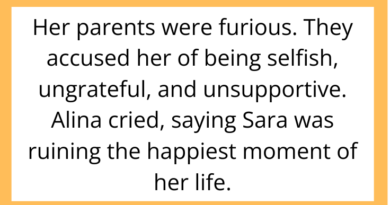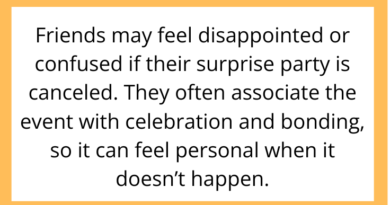AITAH for Not Paying for My Brother’s Honeymoon After He Called My Wife a Gold Digger?
When family expectations collide with disrespect, the fallout can be explosive. A Reddit user recently shared a story on r/AITAH about being pressured to pay for their brother’s honeymoon—even after he publicly insulted their wife. It sparked a heated debate: Are you obligated to help someone who humiliates your partner, or do you have every right to say no? Let’s dive into the situation, unpack the dynamics, and explore what healthy boundaries look like.
The Background: A History of Tension and Envy

According to the original poster (OP), their brother had long struggled with financial instability. Meanwhile, OP built a successful business and married a woman who had an impressive career of her own. Unfortunately, this became a point of jealousy.
Over the years, the brother often made snide remarks about how OP’s wife “married for money.” OP tried to ignore it, believing it stemmed from insecurity. But the comments escalated over time, creating a toxic undercurrent at every family gathering.
The Breaking Point: A Public Insult No One Expected

Everything came to a head at a family dinner celebrating the brother’s engagement. In front of both families, he joked that OP’s wife was “living proof that gold diggers always win.” Laughter erupted from a few relatives, but OP and their wife were mortified.
OP calmly confronted their brother after dinner, explaining how hurtful and disrespectful the remark was. Instead of apologizing, the brother insisted it was “just a joke” and accused OP of being overly sensitive.
OP decided to distance themselves for a while. They felt it was the healthiest choice to protect their marriage from further disrespect.
The Ask: An Unexpected Request for Money

Weeks later, OP received a call from the brother, who was planning a lavish honeymoon he couldn’t afford. He asked OP to cover the costs “as a wedding gift.”
OP was stunned. After everything, the brother still expected financial support—without ever offering an apology. When OP declined, explaining that the repeated insults made it impossible to feel comfortable giving money, the brother erupted in anger.
Word spread quickly. Other family members began calling OP selfish and petty for “holding a grudge over a joke.” OP was left wondering whether their refusal was justified—or if they’d let hurt feelings cloud their judgment.
Boundaries vs. Obligation: Where Should You Draw the Line?

This scenario sparked intense debate in the AITAH community. Let’s break down the main arguments:
It’s Not About the Money
Many readers pointed out this was never about finances. It was about respect—or the lack thereof. Being repeatedly demeaned and then expected to foot the bill crosses a line. If someone can’t show basic decency toward your spouse, why should you fund their celebrations?
As one commenter wrote:
“Respect is the minimum price of admission to any relationship—family or not.”
The Entitlement Mindset
Some users noted how entitlement often shows up in families with uneven finances. When one sibling is more successful, others can feel resentment yet still expect financial support. OP’s brother didn’t just ask for help—he demanded it, assuming OP owed him a lavish honeymoon.
This double standard is common: Those with money are often expected to share it, no matter how they’re treated.
The Apology That Never Came
An apology costs nothing. Had the brother acknowledged the hurt he caused, OP might have reconsidered. But instead, he minimized his behavior and shifted blame. Without accountability, there was no foundation for reconciliation—or generosity.
Lessons Learned: Why Saying No Is Sometimes Necessary

Refusing to pay wasn’t an act of revenge—it was an act of self-respect. OP set a boundary: You can’t degrade my spouse and expect my support.
This doesn’t make OP a jerk. It makes them someone who understands that enabling bad behavior only invites more of it. In families, the impulse to “keep the peace” often leads to tolerating unacceptable conduct. But peace built on silence and resentment isn’t peace—it’s just postponed conflict.
How to Handle Similar AITAH Situations

If you ever find yourself in a comparable scenario, here are some strategies:
1. Clarify Your Boundaries
Decide what behavior crosses the line for you. Make it clear to the person what actions are unacceptable—and what the consequences will be.
2. Don’t Let Guilt Dictate Your Decisions
Family guilt is powerful. But just because someone shares your blood doesn’t mean you owe them access to your resources—especially when they’ve treated you poorly.
3. Offer Alternatives (If You Want)
Some Redditors suggested OP could have offered a smaller, more symbolic gesture—like a modest contribution. But you are never obligated to offer any help if the relationship lacks respect.
4. Stay Consistent
When you set a boundary, expect pushback. People accustomed to crossing your limits will protest when you enforce them. Hold firm.
The Verdict: Are You the Jerk?

The overwhelming consensus on Reddit was clear: OP was not the jerk for refusing to fund the honeymoon. In fact, most users applauded OP for finally standing up to years of disrespect.
As one commenter put it perfectly:
“Kindness without boundaries is just enabling.”
Conclusion: When Standing Your Ground is the Right Thing
This story is a reminder that generosity should never be compulsory—and that true family support goes both ways. If someone disrespects your spouse and never apologizes, you don’t owe them your money or your time.
Whether you’re dealing with a sibling, parent, or friend, remember this: You’re allowed to protect your peace. You’re allowed to say no. And that doesn’t make you a jerk. It makes you someone who knows their worth.



